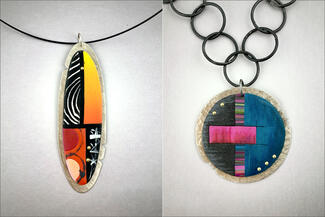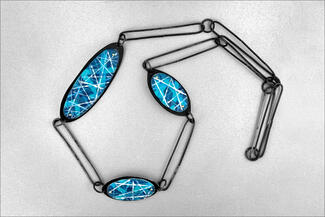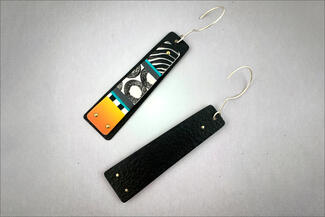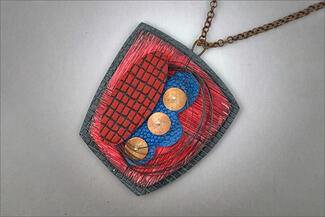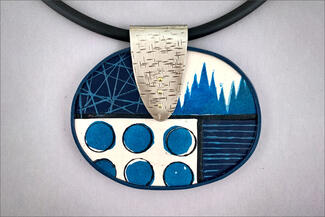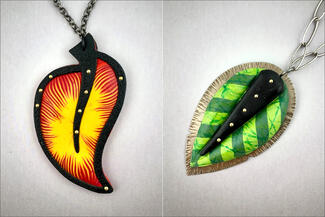The Marriage of Metal and Polymer Clay: Rivets
For metalsmiths and jewelers, rivets are a way to mechanically fasten two materials together, serving as both functional and aesthetic parts in our designs. While traditionally, both the rivet and the materials being fastened are metal, what about the use of rivets in polymer clay jewelry? While polymer clay is not sturdy enough on its own to rivet together by itself, in this virtual class we will get creative and bring the magic of the rivet into polymer jewelry designs!
The primary focus of this class will be an introduction to traditional riveting skills as well as a variety of modifications to make this versatile technique work for polymer clay. Whether the rivets are functional or decorative, exposed or hidden, this demo-focused virtual class will cover several options to open up a new world of possibilities for your polymer creations!
This workshop is one of a 3-part series titled "The Marriage of Metal and Polymer Clay". The focus of these workshops (Links, Rivets, Tabs) will be to introduce simple cold-connection metalsmithing skills for polymer clay that will help elevate a student's work to the next level. Each workshop will be stand-alone, so take one or all and build your skill set!
This class was created for polymer artists that want to incorporate some metal into their work. Focus will be on the metal, not polymer. The instructor will demo options for utilizing rivets, but students should have some polymer veneers/canes ready to work with.
Meet the instructor

Lynn believes that the magic happens in the making—giving time to a creative practice; letting yourself become immersed in the process; sawing, sewing, forming, cutting, hammering, breaking, snapping, rolling, and bending. As you lean into the process, you notice the changes along the way, in your work and in yourself. She loves to share this experience through her many workshops.
Polymer clay is the main material that is used in Lynn’s art jewelry. It has magical properties that allow it to play well with other materials. Her approach is to develop simple elements using mark making, textures, and sgraffito techniques, then she combines and layers them to provide a depth of interest and tactile quality that she so enjoys.
Lynn Yuhr is a self-taught artist. She has a Masters degree in geology and spent 30 years being trained by mother nature. Observing and interpreting nature and the impacts from man-made structures was a way of life. The intersection of these observations (natural and man-made) is what has stuck with her and where she loves to play with her art jewelry.
“My playful curiosity drives my work. When I assess the possibilities, ignore convention, apply techniques from different mediums, and utilize unusual materials is when I have the most fun. I hope the playfulness is passed along to the wearer and brings them a little smile."
Materials & Tools
The following supplies will be used for course demonstrations and objectives. A suggested item and/or vendor has been provided below for reference. Click the vendor name (in red) to be redirected to a page where you can view the item. The quantities needed for each item are listed first. If ordering, please be aware that some items may come in larger quantities than needed for this class. We recommend not opening an item's packaging until the day of the workshop. Student participation during or in-between class sessions is not required - observers are welcome.
Metal/raw materials (This class was created for polymer artists that want to incorporate some metal into their work. Focus will be on the metal, not polymer. The instructor will demo options for creating rivets, but students should have some polymer veneers/canes ready to work with.):
- 6"x12" x copper sheet - 24g (Rio Grande)
- 1 pack x escutcheon pins - 20g (Rio Grande)
- 1 pack x drill bit - #65 (Rio Grande)
- 1 x liver of sulfur gel (Cool Tools)
- polymer vaneers/canes ready to work with
Hand tools:
- 1 x round nose pliers (Rio Grande)
- 1 x chain nose pliers (Rio Grande)
- 1 x flat nose pliers (Rio Grande)
- 1 x snips / flush cutters (Rio Grande)
- 1 x jewelers saw (Rio Grande)
- 1 x pack saw blades - 2/0 (Rio Grande)
- 1 x burlife / bee's wax (Rio Grande)
- 1 x bench pin (Rio Grande)
- 1 x rotary tool - flex shaft, micro motor, etc. (Rio Grande)
- 1 x set of needle files - #2 cut (Rio Grande)
- 1 x center punch (Rio Grande)
- 1 x rawhide / plastic mallet (Rio Grande)
- 1 x chasing hammer (Rio Grande)
- 1 x steel block / steel surface (Rio Grande)
- 1 x small steel ruler (Rio Grande)
- 1 x sanding sticks (Rio Grande)
- 1 x soft metal shears (Rio Grande)
Other/miscellaneous items:
- 2 x glass containers
- baking soda
- steel wool - 0000
- paper towels or rags
- small scrap of leather - 1"x2"
If you have any questions regarding supplies, please feel free to contact Lynn directly at [email protected]!!

